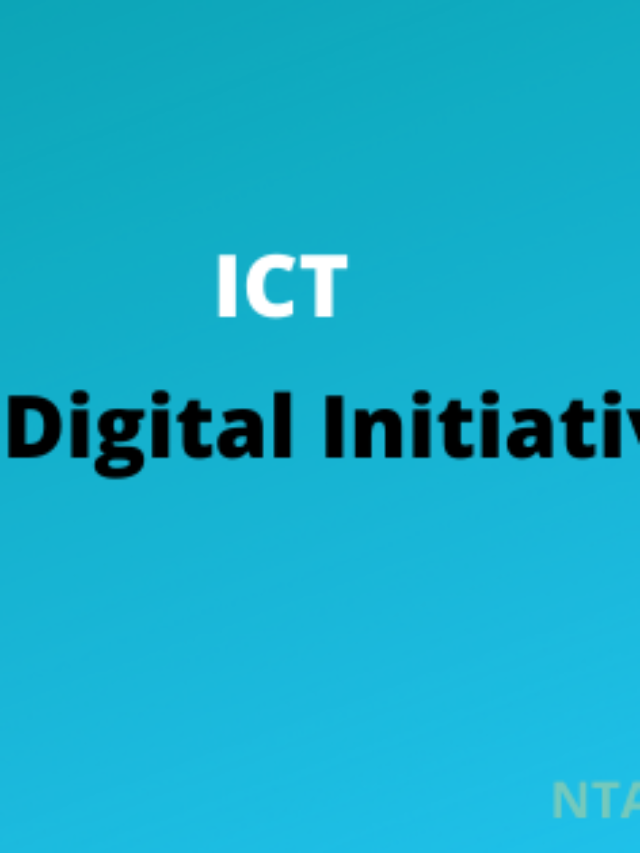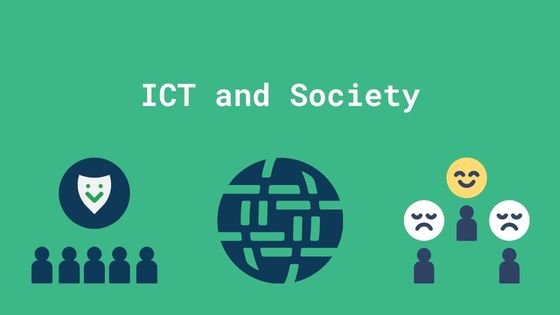ICT (Information and Communication Technology) refers to the technologies used for the collection, processing, storage, and dissemination of information, including computers, the internet, and telecommunications. The integration of ICT in society has had a significant impact on many aspects of life, including communication, education, business, and entertainment.
Communication: The widespread use of ICT has greatly improved communication methods. The internet and social media platforms have made it easy for people to stay connected with friends and family, regardless of their location. Additionally, ICT has made it possible for people to work remotely and for businesses to collaborate with partners and customers around the world.
Education: ICT has also had a major impact on education. Online education platforms have made it possible for students to access educational resources from anywhere, at any time. This has opened up opportunities for people who previously did not have access to traditional forms of education. Additionally, ICT has made it possible for teachers to use interactive tools and multimedia resources in their lessons, making education more engaging and interactive.
Business: ICT has had a significant impact on business operations. The internet has made it possible for businesses to reach a global market, and e-commerce has made it easier for customers to purchase products and services online. Additionally, ICT has made it possible for businesses to automate many processes, such as inventory management and customer relationship management.
Entertainment: ICT has also had a major impact on entertainment. The internet has made it possible for people to access a wide variety of entertainment options, such as streaming services for music, movies, and television shows. Additionally, ICT has made it possible for people to participate in online gaming and other interactive experiences.
the positive impact of ICT on society
Improved communication and connectivity: ICT has made it easier for people to connect and communicate with each other, regardless of location or distance. This has led to a more connected and globalized society.Enhanced education and learning: ICT has transformed the way we access and consume information, making education more accessible and interactive. Online learning platforms, virtual classrooms, and e-books have made education more accessible to people all over the world.Increased productivity and efficiency: ICT has enabled businesses and organizations to automate many processes, reducing the need for manual labor and increasing productivity. This has led to an increase in economic growth and job creation.Greater access to information: ICT has provided people with access to a vast array of information on various topics, making it easier to access knowledge and stay informed. This has led to more informed and engaged citizens.Improved healthcare: ICT has revolutionized healthcare, making it more efficient and effective. Telemedicine and telehealth have enabled doctors to diagnose and treat patients remotely, and electronic health records have streamlined the process of keeping medical records.Increased entertainment options: ICT has provided people with access to a wide range of entertainment options, including music, movies, and games. This has led to more options for people to relax and enjoy themselves.Greater access to government services: ICT has enabled governments to provide citizens with greater access to government services, including online filing of taxes and other forms. This has made it easier for people to access these services and has led to more transparency and accountability in government.Increased opportunities for remote work: ICT has enabled people to work remotely, which has led to greater flexibility in the workforce and has made it easier for people to balance work and family responsibilities.Increased environmental sustainability: ICT has led to the development of more efficient and sustainable technologies, which has led to a reduction in energy consumption and a decrease in carbon emissions.Improved emergency response: ICT has enabled emergency services to respond more quickly and efficiently to emergencies, which has led to a decrease in the number of deaths and injuries caused by natural disasters and other emergencies.
the negative impact of ICT on society
Decreased face-to-face communication: ICT has led to a decrease in face-to-face communication, which can lead to social isolation and a lack of human interaction.Cybercrime: ICT has also led to an increase in cybercrime, such as hacking, identity theft, and online fraud. This can lead to financial losses and personal information being compromised.Digital divide: ICT has led to a digital divide, with some people having greater access to technology and its benefits than others. This can lead to a further widening of the gap between the haves and have-nots.Job displacement: ICT has led to the automation of many jobs, which has led to job displacement and unemployment.Dependence on technology: ICT has led to an increased dependence on technology, and people may become too reliant on it. This can lead to a loss of critical thinking skills and a lack of ability to function without technology.Privacy concerns: ICT has led to a loss of privacy, as personal information is collected and shared online. This can lead to a loss of control over personal information and a lack of trust in online services.Cyberbullying: ICT has led to an increase in cyberbullying, which can lead to emotional distress and mental health problems for victims.Reduced physical activity: ICT has led to an increase in sedentary behavior, as people spend more time online and less time engaging in physical activity. This can lead to health problems such as obesity and heart disease.Decreased attention span: ICT has led to a decrease in attention span, as people are constantly bombarded with information and distractions online. This can lead to a lack of focus and a decrease in productivity.Addictive behavior: ICT has led to an increase in addictive behavior, as people spend more time online and become addicted to social media, gaming, and other online activities. This can lead to a lack of self-control and a decrease in overall well-being.
Overall, ICT has greatly impacted society in many ways, making communication, education, business, and entertainment more accessible and convenient. However, it also poses challenges such as cyber-security threats, privacy concerns and the digital divide among others.











